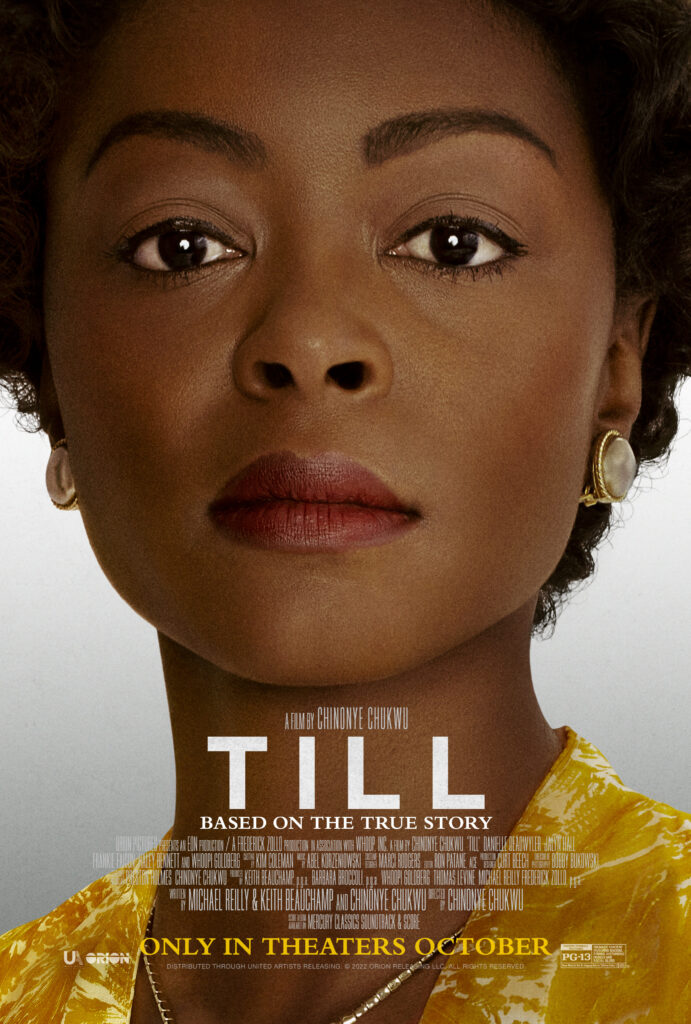In the new film Till, Mamie Till-Mobley (Danielle Deadwyler) stands in front of a crowd after her son
Emmett Till (Jalyn Hall) has been kidnapped, shot, lynched, beaten, and left in a river and says, “I want
America to bear witness.”
Till Review
She wanted America to bear witness to the physicality of her dead child who died of racism. She literally had a viewing of the swollen and tortured remains of Emmett.
Tens of thousands came to show their respect. It couldn’t have been easy, but it was the right and brave thing
to do. After her 14-year-old child was brutally murdered, Mamie Till-Mobley became a Civil Rights hero.
It’s not something that she wanted to become. Like any mother, she just wanted Emmett back.
If you aren’t familiar with the story of Emmett Till, don’t be too surprised. We have an ugly history of
glossing over our nation’s horrendous history. Director Chinonye Chukwu takes the events that
unfolded in August and September of 1955 in a little town in Mississippi and turns them into a raw and
unflinching masterpiece.
Ms. Deadwyler is triumphant in this painful and emotional movie. There isn’t a timeline where she is not nominated for an Academy Award (the same can be said about Chukwu).
She is joined on the screen by Whoopi Goldberg as Alma Carthan, Sean Patrick Thomas as Gene Mobley, John Douglas Thompson (Moses Wright), and Jalyn Hall as the tragic young man whose life ended too soon. The movie is
upsetting, rightfully so, but wonderfully acted.
Middle school-aged children and older should see this movie. Just a heads up it doesn’t show the actual
violence that Emmett succumbed to (luckily, that is all off-screen), but it does show his mutilated body.
It isn’t an easy movie to watch but is one we must watch.
About the movie:
Till is a profoundly emotional and cinematic film about the true story of Mamie Till Mobley’s relentless pursuit of justice for her 14 year old son, Emmett Till, who, in 1955, was lynched while visiting his cousins in Mississippi. In Mamie’s poignant journey of grief turned to action, we see the universal power of a mother’s ability to change the world.
DIRECTOR’S STATEMENT:
When I was approached to write and direct a story about Emmett Till, I found myself drawn to a singular figure at the center of his orbit. I saw an opportunity to subvert expectations and approach the narrative through another lens – from the maternal point of view of Mamie Till Mobley. Had it not been for Mamie, her son’s memory would have evaporated into thin air. She was the catalyst for a modern day civil rights movement that has laid a formidable framework for future activists and Freedom Fighters. I felt compelled to champion Mamie’s legacy and center her in the spotlight where she rightfully belongs.
Mamie’s untold story is one of resilience and courage in the face of adversity and unspeakable devastation. For me, the opportunity to focus the film on Mamie, a multi-faceted Black woman, and peel back the layers on this particular chapter in her life, was a tall order I accepted with deep respect and responsibility. On the Daily, Mamie combatted racism, sexism, and misogyny, which was exponentially heightened in the wake of Emmett’s murder. Mamie did not cower. Instead, she evolved into a warrior for justice who helped me to understand and shape my own similar journey in activism. And as a filmmaker, showing Mamie in all her complex humanity was of utmost importance.
The crux of this story is not about the traumatic, physical violence inflicted upon Emmett – which is why I refused to depict such brutality in the film – but it is about Mamie’s remarkable journey in the aftermath. She is grounded by the love her child, for at its core, TILL is a love story. Amidst the inherent pain and heartbreak, it was critical for me to ground their affection throughout the film. The cinematic language and tone of TILL was deeply rooted in the balance between loss in the absence of love; the inconsolable grief in the absence of joy; and the embrace of Black life alongside the heart wrenching loss of a child.
I hope viewers will empathize with the humanities on screen and see our present cultural and political realities within this film. And I hope that Mamie’s story helps us all to realize the power within ourselves to continue to fight for the change we want to see in the world, just as she did.

Leave a Reply